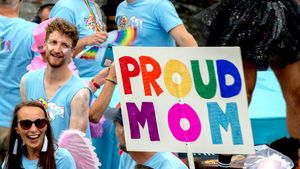Photos by Celeste Sloman
Zero Tolerance, an exhibition currently on view at MoMA PS1, takes its name from the 1990s New York City ordinance that gave police sweeping powers to repress minor offences like homelessness and drug use. On display through the beginning of March, the project aims to highlight the ways in which art has reacted to laws that limit the rights of citizens under the pretence of social improvement. In conjunction, the reigning rock stars of revolutionary artistic expression descended upon the museum last Sunday evening. Masha Alekhina, Nadya Tolokonnikova, and Petya Verzilov of the Russian dissident punk protest band, Pussy Riot, joined MoMA PS1 director Klaus Biesenbach in conversation about the ways in which artists are fighting back against the swelling tide of government oppression.

From left to right: Nadya, Masha, and Petya
Even for those unfamiliar with the specifics of the organization, Pussy Riot has embedded itself into the public conscious -- theirs isn't exactly a name to blend in with the background. A Russian activist group, they are famed for staging illegal, guerilla-style punk concerts to voice ire against their government, President Vladimir Putin in particular. Brightly colored balaclavas are used to mask their identities, and the visible members of this feminist group are women. However, as Petya explained shortly into the discussion, Pussy Riot is made up of more than those who perform in public -- it's a fluid organization that shies away from defining membership criteria. Stephen Colbert was even offered a place in the artistic collective in a tongue-in-cheek interview with Nadya and Masha in February 2014.
The group became internationally recognizable in 2012 when, following a performance in Moscow's Cathedral of Christ the Savior, three members were arrested. While Katya Samutsevich avoided jail-time, Nadya and Masha, both young mothers, were sentenced to two years in penal colonies for "hooliganism." Such a high-handed attempt to stifle political opposition sparked international outrage, and Nadya and Masha became the face of the struggle against Putin's authoritarian regime. In December 2013, the two were given amnesty and released after serving 22 of their 24-month sentence in what was widely seen as a public relations stunt to boost Russia's international image in the lead-up to the Sochi winter Olympics. Despite the fact that their identities are now well known, Nadya and Masha continue their political work. They have appeared onstage next to Madonna and, more recently, testified before members of the United States Senate.
So it was with swagger well deserved that Nadya and Masha made their way toward the stage, visibly buoyed by a deafening applause. Each sported colored streaks in their hair, reflective sunglasses, and a glass of wine in hand. After a brief smile and wave to the audience, they pulled out their cellphones and began taking selfies. The pictures, they said later, were actually quite important. Since their release, the FSB (Russia's equivalent of the FBI) have been trailing them hard. At Sochi, they estimated that there were likely hundreds if not thousands assigned to monitor them. Not only were they detained daily, but a group of Cossacks were sent in to beat and whip them, a disturbing scene caught on camera. They joked that there were probably even a few FSB officers in the audience, adding that an up-to-date Instagram account was their gift to the Russian police -- it makes their jobs easier.

The two twenty-something revolutionaries hold themselves quite similarly. Only the slightest of smirks upturned at the corners of their mouths would have betrayed the fact that whatever response Petya, Nadya's Russian-Canadian husband, was about to translate was sure to get a laugh. But once the rest of us were in on the joke, smiles erupted with dazzling sincerity. And while Nadya started the event by saying that she and Masha would speak in Russian due to their poor English, it quickly became clear that they'd picked up quite a working knowledge of the language.
At one point, Petya was in the middle of translating an answer of Nadya's, "... she was with her girlfriend..." when, after shooting her husband a quizzical look, Nadya jumped in. "Girlfriend!? I wish she was my girlfriend! But she wasn't." "OK, I meant a friend who is a girl," Petya said, beginning again.
Such interruptions punctuated the whole of the talk, keeping everybody on their toes. Discussion shifted, winding its way through some of their more sensational demonstrations. Over the space of a few months in 2011, they went around the Moscow subway french-kissing female police officers. Members of their earlier group, Voina, also painted a massive penis on a draw bridge that, once raised, was visible to the FSB headquarters. "[Could] the FSB see it?" asked Klaus. "They can see everything," Masha quipped back.
The three members gave insight into the life of political activists in a rigidly controlled society, which includes secret Hollywood-style rendezvous in crowded cafes and Skype interviews set up on the toilet seats in public bathroom stalls. This last point was why, Masha explained, Pussy Riot was not particularly popular in Moscow's Starbucks.
Yet while their charms kept the mood in the dome elated, sobering truths were never far beneath the surface. When asked if Nadya and Masha thought they were going to be sent to prison (their sentences could have been anywhere from two to seven years), they said they were positive. The acquittal rate in Russia is now less than 1%, Petya explained, while under Stalin it was 10%. They thanked the international community for taking their cause to heart, attributing their lenient sentences and early release to the massive publicity surrounding their case. They added, however, that most were not so fortunate.

After answering a few questions, shaking many hands, and squeezing in a few more selfies, members of the press were led upstairs to a room whose fluorescent lights tried, but failed, to wash out the glow of Manhattan's skyline. In between wine and cookies, I was introduced to the women as a representative from Out magazine. An answer to Masha's querying look was offered by her publicist's simple explanation: "gay." "The biggest gay," I added. And with a flourish of her hands, Masha had me to lead the way.
As my photographer set up in the hallway, I had the two formidable women to myself for a few minutes. Once again wearing their sunglasses, they leaned in close to answer my questions. Without Petya, it was a much more collaborative affair, interspersed by rapid asides in Russian to work out a word in English, and requiring a few re-phrasings on my part.
Out: You were obviously at the Sochi Olympics, and there was a huge movement to boycott them in reaction to the anti-gay propaganda law. Do you think the international community should have boycotted them?
Masha: We think boycotting is the easiest way to protest--
Nadya: --and the most boring.
Masha: Yes. And we are more, I think, creative. We try to [use] more interesting ways to protest than just boycotts. But, anyway we ... [Russian] ...
Nadya: Appreciate.
Masha: We appreciate people who [do] anything, even if it's just boycott.
I then asked why they focus their energies so fully on Putin. As expressed in The Advocate's current cover story, Pussy Riot holds the Russian president responsible for their nation's entrenched intolerance, especially in regards to its institutionalized homophobia. I pointed out that the first Russian to be granted asylum in the United States on the grounds of homophobic persecution was Slava Mogutin, an artist now based in New York, in 1995, years before Putin assumed the power he has today.
Nadya: We have homophobic [communities and groups] who are now supported by the government--
Masha: But they are so fucking stupid.
Nadya: Exactly, but they are now seen as [powerful] because the government supports them.
Masha: When you [see] anti-gay people try to break [up] gay demonstrations, they just [lose] their words. They cannot remember what they should say. [They are] not your real opponient .. oponent... how do you say the people who are--
Nadya: Against you?
Out: Opponent.
Masha: Yes! Opponent. [Putin is the real opponent for giving so much power to anti-gay groups].

Even having only spent a short time with Nadya and Masha, the impression they left me with was one of awe. Their bravery is hard to fully comprehend. They still live in Moscow, the site of multiple arrests, beatings, and police harassment. It may not be easy to protest in Russia, they admit, but they believe it would be cowardly to leave. Instead, they continue to plan and carry out their artistic demonstrations in the hope of inspiring others to similarly take a stand. As the police get craftier -- something they actually celebrate, taking credit for helping the police embrace their creative side -- so do they. Yet for all their composure and resolve, the most striking aspect is their indefatigable liveliness, the vibrancy of their humanity. Perhaps Putin is rightly afraid to utter the name Pussy Riot; I certainly wouldn't want to find myself with enemies like these two.
Nadya and Masha announced that are currently working on a book which details their time in prison.





























































































